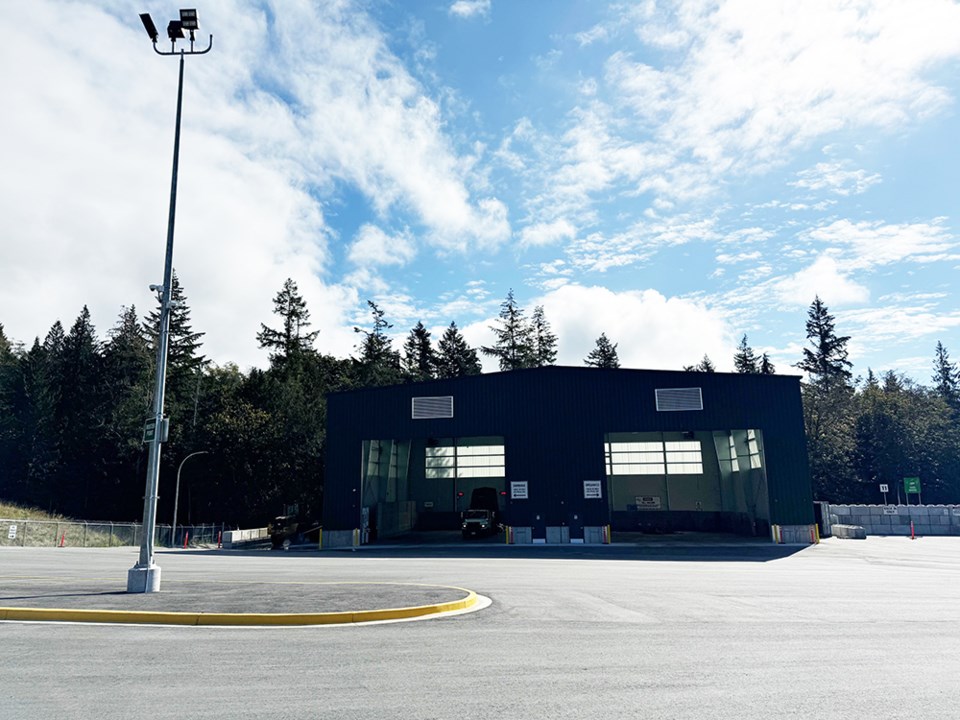Household garbage is now being accepted at the new resource-recovery centre (RRC).
qathet Regional District (qRD) manager of environmental services Jason Kouwenhoven said what is known in the ministry of environment as municipal solid waste (MSW) has been collected at the centre since September 16 and drop-off will be completely transitioning from Augusta Recyclers by October 1.
According to qRD waste diversion supervisor Becca Willes, MSW includes garbage from all households and businesses in the region.
“MSW is destined for landfill and does not include construction and demolition waste, hazardous waste, recyclable or compostable materials,” said Willes.
Kouwenhoven said the RRC now is open Monday to Saturday from 8 am to 5 pm for public drop-off, which includes MSW from businesses and industrial, commercial and institutional establishments. He said that while the term MSW includes municipal, the RRC is meant for not only people in the city, but also for those in the rural qathet Regional District electoral areas.
Rates for MSW are $280 per tonne, with a minimum charge of $7.50. Kouwenhoven said that currently, the RRC only accepts debit and credit cards and is not in a position at this time to process cash.
“This is a limited opening of the RRC, so we are still putting systems in place, and currently, we only accept debit and credit card payments,” said Kouwenhoven. “If you are a business, you can apply for a charge account and then we can provide billing.”
Kouwenhoven indicated that the RRC is not fully functioning at this time.
“We are still finishing construction on part of the facility, but we have opened MSW to the public so they can start using our new facility,” said Kouwenhoven. “We are having a gradual opening and we have prioritized our MSW waste and our organic waste because those are our largest volumes of materials in the whole regional district.
“The next step will be to open our recycle centre, which we are aiming to have operating in October.”
Later, the RRC will collect additional materials, such as construction and demolition materials, metal, appliances and tires.
In terms of organic materials, the best way to dispose of them in the city is to use the curbside bins, because the RRC is currently not accepting self-haul loads of organic materials. Kouwenhoven said if people are not part of the municipal organics collection, they can take materials to Sunshine Disposal or Augusta Recyclers, or to the recycling depots at Tla’amin Nation and the Town Centre mall facility.
Landfill diversion
In terms of the diversion programs at the RRC, they are still a work in progress. The facility has been designed so materials that can be repurposed can be dropped off and reused so they don’t end up in landfill.
“One of the major reasons for building this facility the way it is built is to reduce the amount of material that goes to landfill,” said Kouwenhoven. “We try to move that material into a recycling program or find a better use for it rather than burying it. The most expensive thing we can do in this region is ship our garbage out of the region to landfill. It currently leaves Canada and goes to Washington State and the cost of shipping material that far is very expensive.
“So, this facility, every part of it, is going to encourage diversion. We’re going to encourage recycling. We’re going to encourage finding other uses and other options for materials such as wood and metal and organics.”
Kouwenhoven said the organics collection program is a huge win. He said in 2021, the regional district conducted a waste audit and determined that more than 40 per cent of the waste stream is organic material. Under the new city program, the organics collected are shipped down to Sechelt rather than being barged to Washington State.
“We have the opportunity to send 40 per cent less material to landfill,” said Kouwenhoven. “The organics are being turned back into garden soil, and it’s keeping it local, because we have access to this usable product. It becomes very nutrient-rich garden soil and local gardeners can avail themselves of it.”
Ultimately, transporting such a large amount of the waste stream at a much shorter distance also means less contribution to greenhouse gases.
“When people start to come here and use the facility the way it was intended to be used, we will be living the dream of reducing our garbage and reducing our impact on the environment,” said Kouwenhoven. “Having a facility like this really does let us contain our garbage. Most of the materials we accept will be enclosed, which means they can’t leach into the soil. They are not being burned and then contaminating the air. Having the materials inside buildings with the doors closed keeps wildlife out. So, there are really big ways we are reducing the impact our waste has on the environment.”
Join the Peak's email list for the top headlines right in your inbox Monday to Friday.



